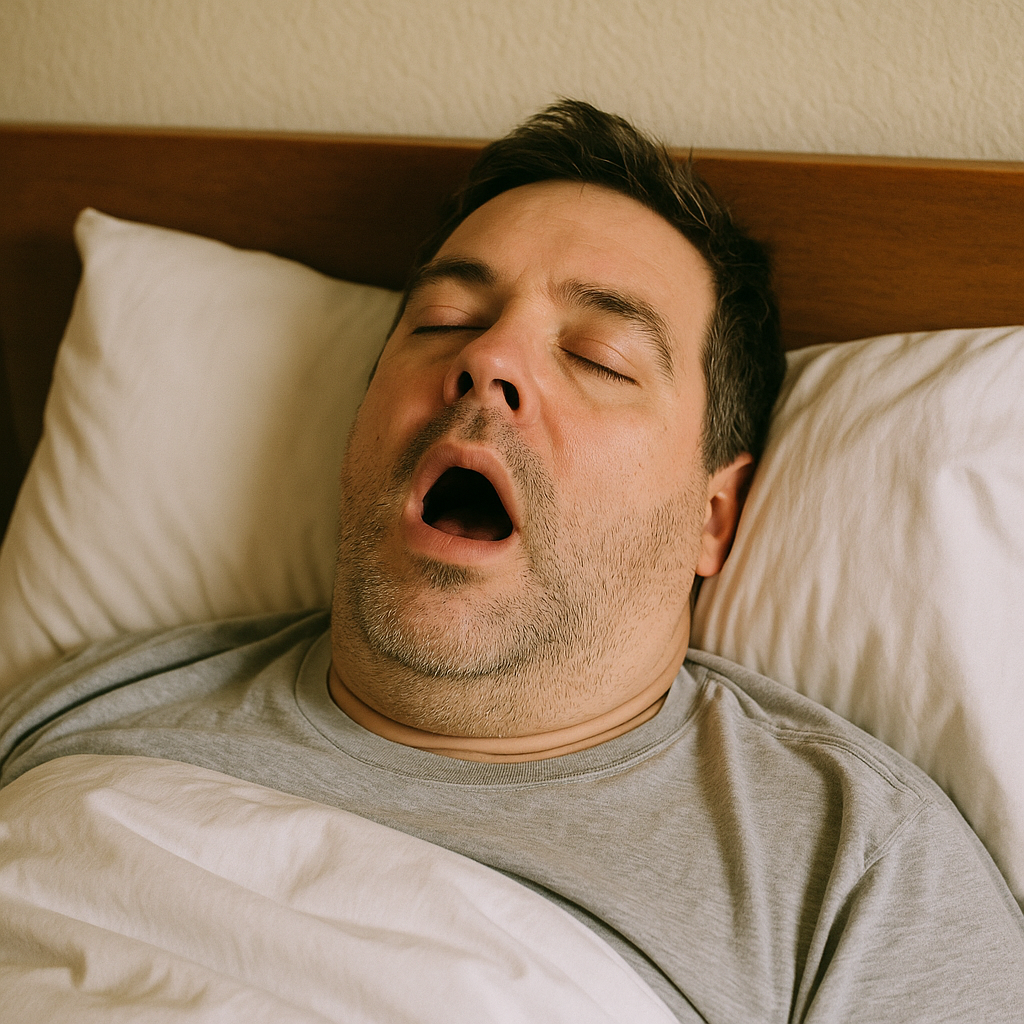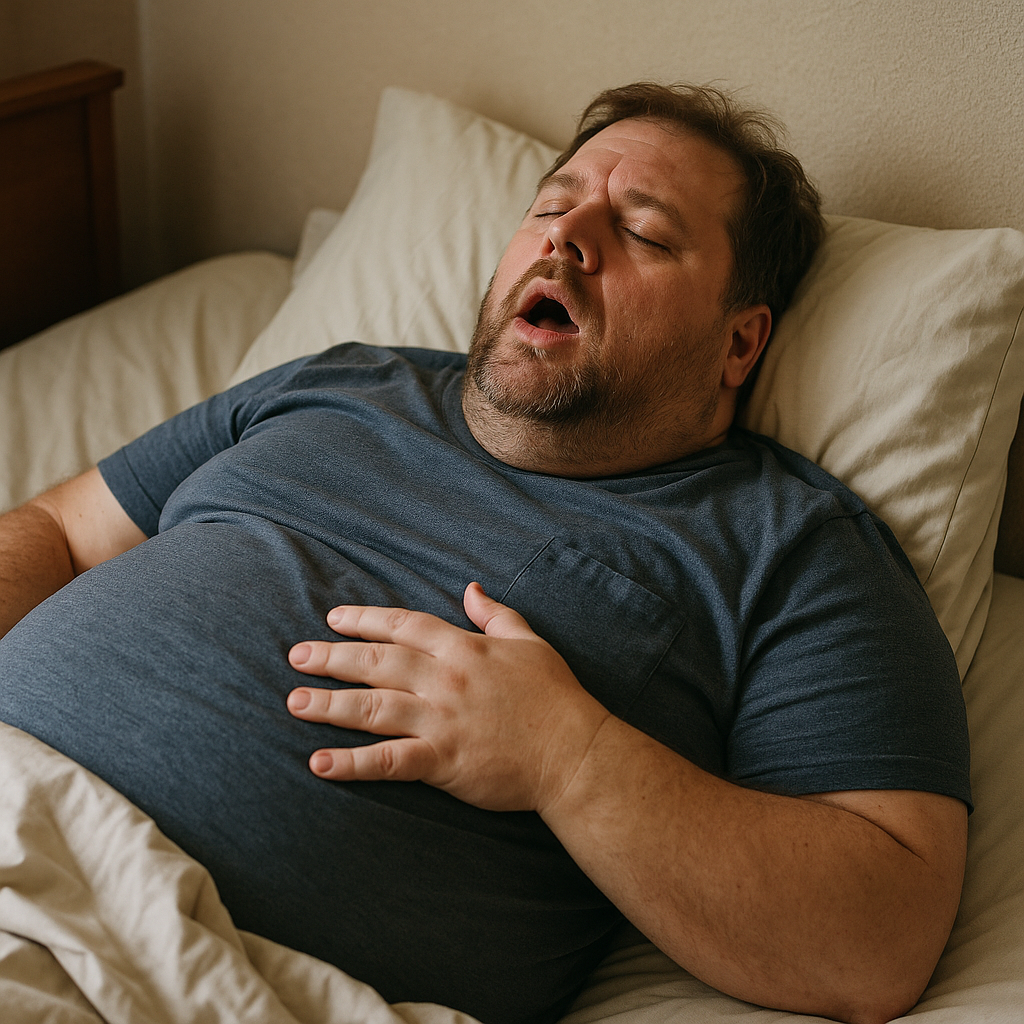Ask Ayurvedic doctor a question and get a consultation online on the problem of your concern in a free or paid mode. More than 2,000 experienced doctors work and wait for your questions on our site and help users to solve their health problems every day.
What Causes Sleep Apnea?

If you’ve ever woken up gasping for air in the middle of the night, or if your partner’s loud snoring has kept you up (again), you might be dealing with more than just a bad night's sleep. Sleep apnea is a serious condition—more common than people think—and it affects not just your sleep but your whole system. It can sneak up on you, and before you know it, you're always tired, gaining weight, or even struggling with blood pressure.
Understanding what causes sleep apnea is the first step to tackling it. Whether you’re trying to figure out the causes of obstructive sleep apnea, or wondering how your nervous system plays a role in central sleep apnea, there’s a lot to uncover. And if you’re someone looking for a more natural, holistic view (hello Ayurveda), you’re in the right place. Let’s explore the sleep apnea causes, symptoms, and solutions—without the medical jargon overload.
What Is Sleep Apnea and Its Most Common Forms
Sleep apnea is a condition where breathing repeatedly stops and starts during sleep. Sounds scary? That’s because it can be. These pauses can last from a few seconds to minutes and might occur 30 times or more in an hour. That’s not just poor sleep—that's your body being deprived of oxygen, over and over.
There are two main types of sleep apnea:
-
Obstructive Sleep Apnea (OSA): This is the more common one. It happens when the muscles in the back of your throat relax too much, narrowing or completely closing your airway.
-
Central Sleep Apnea (CSA): Less common, but equally dangerous. It occurs when your brain fails to send proper signals to the muscles that control breathing.
Sometimes, people have a combo of both—called complex sleep apnea syndrome, which makes diagnosis and treatment a bit more tricky.
Now, let’s go deeper. What actually causes sleep apnea to develop in the first place?

Don't wait or self medicate. Start chat with Doctor NOW
Major Causes of Sleep Apnea in Ayurveda
In Ayurveda, disease is seen as the result of imbalance in the body's doshas—Vata, Pitta, and Kapha. Sleep apnea, especially OSA, is often linked to an aggravation of Kapha dosha, which governs heaviness, mucus, and structure. But it’s not just about Kapha. Prana (life-force energy) and Vata (which governs movement, including breath) also play a vital role.
Causes of Obstructive Sleep Apnea: Excess Kapha, Obesity, and Airway Blockage
When Kapha accumulates—due to poor diet, sedentary lifestyle, excessive dairy or cold foods—it leads to heaviness and congestion. This can block the nasal passages and throat, literally causing sleep apnea through airway restriction.
Add to that weight gain (another Kapha-driven symptom), and the airway narrows even more. It’s no surprise that sleep apnea causes weight gain, but it’s also a vicious cycle: weight gain can cause more apnea, and apnea makes it harder to lose weight due to fatigue and hormonal imbalances.
Causes of Central Sleep Apnea: Nervous System and Prana Imbalance
CSA is different. Here, the problem isn’t physical blockage—it's neurological. Ayurveda attributes this to an imbalance in Vata dosha, especially the Prana subdosha, which governs breathing and brain function. When Vata is disturbed—maybe from stress, irregular routines, or trauma—the signals from brain to body get fuzzy. That’s when central sleep apnea causes interrupted breathing patterns without any throat blockage.
In both types, the body is out of sync. And over time, sleep apnea causes high blood pressure, heart strain, and chronic exhaustion. Ignoring it? That’s not an option.
Sleep Apnea, Weight Gain, and High Blood Pressure Connection
Let’s talk about the ripple effects. Many people don’t realize how sleep apnea causes weight gain—but the connection is strong. When your sleep is constantly disturbed, the body produces more cortisol (that pesky stress hormone), which can lead to cravings, fat retention, and a slower metabolism. You wake up exhausted, and your energy dips throughout the day. You skip workouts. You eat more sugar. And before you know it, pounds creep on.
And it gets worse. Sleep apnea causes high blood pressure too, because the body goes into panic mode during those breathless moments. Oxygen drops, the heart races, and the blood vessels constrict. Over time, this constant stress leads to hypertension. In Ayurveda, this would be seen as a mix of aggravated Vata (stress response) and Pitta (inflammation), causing imbalance in both mind and body.
So now you have fatigue, weight gain, and high blood pressure. All feeding into each other. It’s like a bad group project where every part makes the other one worse.

Preventing Sleep Apnea with Ayurvedic Lifestyle and Diet
The good news? Ayurveda doesn’t just explain the causes for sleep apnea—it offers real, grounded tools to bring your body back into balance. Unlike quick fixes or pills that only mask symptoms, Ayurvedic practices aim to work on root causes: excess weight, imbalanced doshas, poor digestion, and nervous system overload.
Breath Practices, Sleep Hygiene, and Nasya Therapy
First off, pranayama (breath control) is key. Simple techniques like nadi shodhana (alternate nostril breathing) or bhramari (bee breath) can calm the nervous system and improve oxygen flow. These aren't just ancient rituals—they actively help reset Vata and Prana flow, which are directly linked to breathing regulation.
Improving sleep hygiene is another big one. That means no screens an hour before bed, going to sleep around 10 PM, and keeping the bedroom cool, dark, and quiet. You know—common sense stuff, but we all ignore it half the time, don't we?
Then there's Nasya, the practice of lubricating the nasal passage with medicated oils. Just a few drops of herbal oil in each nostril can help reduce congestion, balance Kapha, and open up airways. It's especially helpful for those whose causes of obstructive sleep apnea are rooted in sinus blockages or mucous buildup.
Reducing Root Causes Through Detox and Routine Alignment
Ayurveda loves a good reset. Gentle seasonal detoxes (like panchakarma or even simplified home versions) can help remove excess Kapha and toxins from the system, especially if diet’s been off or digestion feels sluggish. Not the scary juice cleanses you see online—but real detox focused on proper food, herbal support, and routine.
And let’s not overlook daily rhythm, or dinacharya. When you eat, sleep, and move in sync with natural cycles, the doshas stay balanced. For example, eating your biggest meal at lunch (when digestion is strongest), and avoiding late-night snacks that aggravate Kapha and disrupt sleep.
It's not about being perfect. It's about consistency. Even small changes, like going to bed earlier or swapping that ice cream for warm spiced milk, can shift things big time.
Conclusion
So, if you've been wondering what causes sleep apnea, now you know—it’s not just one thing. It's a complex condition that can stem from physical blockages, nervous system glitches, lifestyle imbalances, or even emotional overload. From the Ayurvedic lens, it's often a result of excess Kapha (think: mucus, heaviness, weight), disturbed Vata (anxiety, irregular rhythms), and weak digestion or poor routines.
But don’t let that overwhelm you. The key takeaway? Sleep apnea has causes—and solutions. Understanding your body's signals, tuning into your habits, and gradually aligning your life with balance can make a profound difference. It's not a switch you flip overnight, but a journey you start one step at a time.
If your sleep is poor, your energy is shot, and you’re gaining weight without a clear reason, don’t ignore it. Sleep apnea causes high blood pressure, heart strain, mood dips, and more—but with awareness and a holistic approach, you can take back control.
Whether you try Ayurvedic practices, get a sleep study, or simply start with better sleep hygiene, the point is: do something. Share this article with a friend who snores like a chainsaw, or that tired co-worker who’s always yawning at 10 a.m. It might just open a new path to wellness for them too.
Want to sleep better naturally? Explore more holistic tips by checking out our guide to Ayurvedic sleep practices and dosha-balancing recipes. Or share this with someone who really needs to breathe easier at night. Because good sleep isn’t a luxury—it’s essential.
FAQs
Can Ayurveda explain why overweight people are more prone to apnea?
Yes, definitely. In Ayurveda, being overweight is often a sign of Kapha imbalance—heaviness, sluggish metabolism, and accumulation of mucus and toxins. This buildup can cause tissues in the throat to sag or narrow, literally leading to obstructive sleep apnea. Excess weight also compresses the chest and diaphragm, making breathing harder during sleep. So, from this perspective, the body’s structure and doshic imbalance both contribute to apnea risk.
Does sleep apnea always lead to high blood pressure?
Not always, but... a lot of the time, yes. The repeated oxygen deprivation during the night forces the body into “fight or flight” mode—raising your blood pressure to wake you up. Over time, that constant stress on the cardiovascular system adds up. So while not everyone with sleep apnea develops hypertension, there’s a strong link. And if you're already at risk for BP issues, apnea just fans the fire.
How can Kapha imbalance be corrected to reduce apnea symptoms?
Great question. The goal is to reduce heaviness and stagnation in the body. That means:
-
Eating light, warm, and spiced foods—think: ginger tea, steamed veggies, soups.
-
Avoiding dairy, fried food, and cold stuff like ice cream (sorry, we know).
-
Exercising regularly, especially in the morning.
-
Doing cleansing practices like trikatu (a blend of pungent herbs) or mild detox routines.
-
Using Nasya therapy to clear nasal congestion.
-
Sticking to a daily routine that supports good digestion and sound sleep.
When Kapha is balanced, the airway stays clearer, weight stays in check, and breathing becomes smoother—even at night.

